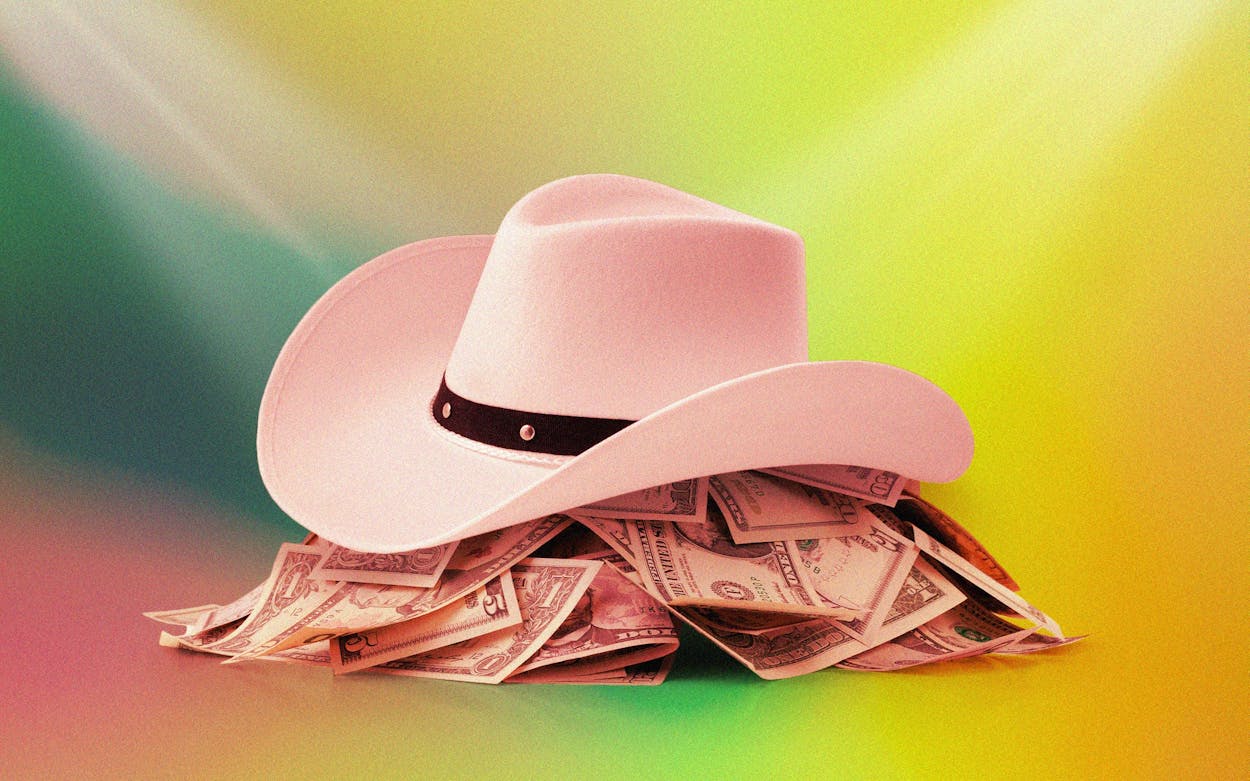Eighteen years after Peggy Jo Tallas died by what’s now called “suicide by cop,” the story of Texas’s most unlikely bank robber is the stuff of urban legends.
Polite, generous, and otherwise law-abiding, Tallas first made headlines in the early 1990s when she pulled off a string of five bank heists in the suburbs of Dallas disguised as a bearded man in a ten-gallon hat. The authorities nicknamed her Cowboy Bob before they caught up with her in 1992 and realized, as one lawman said, that their man was not a Bob but a “Babette.” Tallas was in her mid-forties then, and after nearly three years in prison, she lived quietly until she was sixty. She died after one last robbery, like the heroes of her favorite movie, Butch Cassidy and the Sundance Kid, in a shootout with police with one important caveat: she brandished only a fake gun. Violence was never her M.O.
It was the “why” more than the “what” of Tallas’s odd story that intrigued playwright Molly Beach Murphy, much as it had Texas Monthly’s Skip Hollandsworth when he profiled Tallas in 2005. Murphy instinctively saw Tallas’s story as a musical—“because the form is built on tales of small people who do big things, or have big desires, who swing for the fences,” she told me during a Zoom interview that included her collaborators, director Annie Tippe and composer Jeanna Phillips.
Their Cowboy Bob, which premieres March 3 and runs through March 26 at Houston’s Alley Theatre, takes ample liberties with facts. To play up “the Cowboy Bobness of Cowboy Bob,” as Phillips put it, they imagine Peggy Jo as an epic, mythical figure whose stick-it-to-the-man spirit inspires a fictional waitress named Rena to blow her unfulfilling life apart. Their narratives run along parallel tracks but on different planes of time and space. Like Peggy Jo, Rena is tired of going to extraordinary lengths to get by.
This much is true: Tallas struggled to keep up with medical bills for herself and her ailing mother. In the beginning, she made robbing banks look almost hilariously easy. Walking calmly into the lobby with her head down, she would hand a teller a note without speaking. She didn’t score huge amounts of cash—a few grand at most—and miraculously, tellers obeyed the note’s warnings not to give her any dye packs, which explode and leave a colorful trail. Tallas would exit without rushing, get into her old Pontiac Grand Prix as if nothing had happened, and disappear into traffic. She got away with it for more than a year because she stole license plates for each heist. The first time she used her actual plate, she was caught. Her arrest startled even her closest friends and family, who had no idea what she was up to.
The real Tallas, who wasn’t married and had no kids, was so private she didn’t even explain her motives to the judge who sentenced her. After prison, she returned home to care for the mom she adored. Working the cash register at a Lake Ray Hubbard marina for the next decade, she never stole a dime. People knew her as generous and big-hearted. After her mother died, Tallas bought a used RV and left town, telling folks she wanted to live carefree, on a beach. Her retirement plan apparently involved one more heist, and it would have been her biggest hit ever—about $11,000—if the bag hadn’t held a dye pack and she hadn’t been driving the lumbering RV.
Murphy, a Galveston native, was a senior at Ball High School in 2005 when Tallas was killed. After graduating from Southern Methodist University with a theater degree, she could relate at least a little to the wanderlust. She kept day jobs to survive her first years in New York, finding her best gigs as an associate director on large off-Broadway productions. She produced some early work in grubby theater spaces, but wasn’t really thinking of herself as a playwright when she got a cold call from Tippe.

An up-and-coming director about the same age as Murphy, Tippe had won a residency that tasked her with finding new collaborators and ideas. Murphy mentioned her Cowboy Bob concept. Tippe loved it and brought in Phillips, whom she’d met when they were students at New York University, to create the score and lyrics. That was seven years and many workshops ago—a gestation period so long, the trio came to think of themselves as American musical theater’s Thelma and Louise: a band of creative feminist outlaws trying to make something life-changingly powerful against the odds. Any play built around two female leads is a rarity, but musicals starring women are especially scarce.
“Most musicals live forever in a stage of development,” Tippe said. She feels like they’ve arrived at “the dream version” for the Alley’s big Hubbard Stage, although it may not be the end of the trail. Cowboy Bob recently received an Edgerton Foundation New Play Award that supports more development and rehearsal time to keep the show alive after the world premiere.
Tippe cast Jackie Burns, a long-time Elphaba in Wicked, as Peggy Jo and Ashley Pérez Flanagan, who also has Broadway chops, as Rena. Seven other actors perform multiple roles. The team was still tweaking music in late February during the first rehearsals with the show’s six-piece band. (All the musicians are from Texas. Phillips said she was blown away by the talent of the performers who auditioned from Houston.)
Cowboy Bob has a memorable score of more than a dozen songs, including some with sharp lyrics that I haven’t been able to get out of my head since listening to a private recording from an orchestration workshop in Brooklyn. It should be a helluva soundtrack, mixing the euphoric rage of a few Riot grrrl–inspired numbers (“Nine Steps” and “Circle the Line”) with country tunes that could be at home in a smoky honky-tonk (among them the sad “My Old Lady,” the waiters’ anthem “Sleeper,” and the boot-scootin’ “Red Mountain”) and evocative folk tunes (“Canyons” has a hint of classic Joni Mitchell in it, and the yearning is palpable in songs like “Free,” “Scrap Metal,” and “Mexico,” a duet for the two leads).
“Country music is an incredible container for musical theater storytelling, especially for a story with the kind of longing that ours contains,” Phillips said. “And because this is a show with ‘Cowboy’ in the title and we are in Texas, it made all the sense in the world to lean into that genre.” Meanwhile, folk is her “native language” as a songwriter. “We’ve tried to give each character their own very specific sonic space, so each song feels unique to the person who’s singing it,” she said.
There hasn’t been a big, successful musical with this much of a twang in it since The Best Little Whorehouse in Texas kicked its way onto Broadway in 1978, eventually becoming a hit movie starring Burt Reynolds and Dolly Parton. I’m two-stepping out on a limb here, but the Cowboy Bob score, even unfinished, feels more bankable to me. Whorehouse, by the way, is also based on a true story about female outlaws—the ladies of La Grange’s infamous Chicken Ranch, whose livelihood was under assault by the showboating Houston TV reporter Marvin Zindler. Thankfully, some things have changed: the Cowboy Bob gals are fully in charge.
I asked Murphy, Tippe, and Phillips if Cowboy Bob could have happened anywhere else but Texas, and what, aside from that, makes it a Texas story. “They say everything’s bigger in Texas, and this is a story about big dreams and people making big moves, so it makes sense to me that that’s where this legend takes place,” Phillips said.
Murphy took a philosophical track. “In writing, the thing that makes something feel universal is how specific it is,” she said. She tries to create characters that are like her own big, tight-knit family of expert tall-tale-tellers from Galveston—“people who have hopes like them and heartbreaks like them, talk in the cadences that they talk in when they tell stories,” she explained. “Our hope is that if we’ve created characters that feel specific and truthful, from there we can create a story that feels universal.”
Ultimately, said Tippe, Cowboy Bob is a musical about hope. It’s also a comedy. “We’re dealing with some heavier themes but ultimately the piece is very funny, very witty, very authentic,” Tippe said. “We hope you leave feeling really buoyed and inspired just to take on your life anew.”






